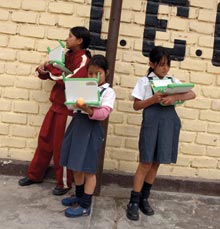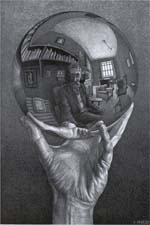News
An Open Letter...
Feb 08, 2010
 ...to our 535 esteemed legislators:
...to our 535 esteemed legislators:
Today, the Association for Computing Machinery (the world’s largest group of computer professionals) announced the winners of the 2010 ACM International Collegiate Programming Competition.1,2 And guess what? The only non-Russian, non-Chinese school in the top ten was the University of Warsaw (Poland, not Indiana). That’s right. Not only did we not finish in the money, we didn’t even finish with honor.
If you cannot see that these results are the canary in the coal mine, auguring disaster for the future of American innovation and competitiveness, then you are even more clueless than you have led us to believe over the past year. While states are busily disordering their legislative framework in a headlong rush for $4.35 billion in federal support, the pittance for which they are competing3,4; while a lone representative (enabled by the Speaker) threatens to destroy the most successful program of technological innovation in history in order to keep her re-election campaign chest stocked with corporate lucre5,6; our nation has gone from an overwhelmingly dominant position in computer science only a few years ago to tying for 14th place with the likes of the Belarusian State University and the Universidade Federale de Pernambuco.
While you Lilliputian Neros fiddle, Rome burns. If we can’t compete with Russia or China in computers, we can’t compete in biomedicine, weaponry, space applications, finance, manufacturing, entertainment, or any of the other industries which, today, are absolutely dependent on computing know-how. And if our programming and computing skills are not up to those of our two giant totalitarian antagonists, then our national security and our hope for spreading democracy across the globe are in dire peril as well.
This is the pass to which you have brought us, and we have no one to thank but ourselves for not taking you all by the collar and heaving you out that magnificent panelled doorway into a snowdrift.
Update: We are responding! See Want a job? Get a computer science degree. Enrollment in computer science is back on the way up!
____________________
1 Chinese and Russian Universities Claim Nine of Top Ten Spots..., accessed, as were all items footnoted in this entry, Feb 8, 2010.
2 Results World Finals 2010.
3 Race to the Top funding faces obstacles, by James Rufus Koren and Canan Tasci, from the Inland Valley Daily Bulletin, Feb 7, 2010.
4 Pressing for changes to charter school laws, by Nicole Fuller, from the Baltimore Sun, Feb 7, 2010.
5 SBIR Insider Newsletter, by Rick Shindell, Jan 11, 2010.
6 Full Disclosure: I work for a company that contributes its expertise to the SBIR program.
Plus Ça Change, Plus C’est la Même Chose1
Oct 23, 2008
 Harnessing computer power for purposes of enhancing information gathering and communications has revolutionized our lives and brought forth a brave new world in a far shorter time span than any comparable revolution—if there is any comparable revolution— in human history. Dramatic changes—in health care, in education, in practically every area of human endeavor—will continue to bombard us at a similar rate throughout the rest of our lives and this century. The shape and nature of the future from today’s embryonic perspective is unimaginable.
Harnessing computer power for purposes of enhancing information gathering and communications has revolutionized our lives and brought forth a brave new world in a far shorter time span than any comparable revolution—if there is any comparable revolution— in human history. Dramatic changes—in health care, in education, in practically every area of human endeavor—will continue to bombard us at a similar rate throughout the rest of our lives and this century. The shape and nature of the future from today’s embryonic perspective is unimaginable.
The Information Technology and Innovation Foundation has identified and summarized many of the areas where our lives have been most impacted in their report, Digital Quality of Life: Understanding the Personal and Social Benefits of the Information Technology Revolution. They offer policymakers ten key principles to follow to empower their citizens to take full advantage of the digital revolution. Information Technology (IT) has improved individual lives in areas including education, health care, personal safety, and accessibility for the disabled. Globally, IT plays crucial roles in challenges involving the environment, energy, transportation, and public safety, as well as enhancing government services on all levels. It has revolutionized access to information in developing countries, spurring them on to greater levels of economic growth and democratic self-determination.
And yet...and yet. For all its wonders—and we are keenly aware of them because we sit in front of a computer for at least five hours a day seven days a week—we wonder to what extent all this technology is really bringing us together. Though at long last, to quote the old AT&T ad, “We're All Connected,” the extent to which that connection has worked to bring us together for the betterment of our species and our planet remains conjectural.
Although Kiva has introduced thousands of social investors to struggling entrepreneurs in developing countries, Democracy Now! has brought us essential intelligence ignored by the corporate-dominated media, and MoveOn.org and other grassroots Internet organizers have utilized our connectedness to forge multi-million-member activist and donor networks, we wonder to what extent the world has moved closer to understanding that, beyond being connnected to one another, we are responsible for one another. Though preached by every religion, this imperative is not embodied in any official national mission statement, even insofar as it might pertain solely to a nation’s own people.
Our species will endure only if we pursue optimal conditions for all living things, in the mature knowledge that being our brother’s keeper is not some altruistic fantasy, but a condition of our own survival.
____________________
1 The more that changes, the more it’s the same thing.
Software for Hard Times
Sep 08, 2008
 Programming is the most fun you can have with a computer. If you're not a programmer, you may have written a macro in Word or (even better) in WordPerfect for DOS (the greatest software application ever). If so, you have gotten a tiny taste of the power waiting at your fingertips.
Programming is the most fun you can have with a computer. If you're not a programmer, you may have written a macro in Word or (even better) in WordPerfect for DOS (the greatest software application ever). If so, you have gotten a tiny taste of the power waiting at your fingertips.
And if you can combine programming with doing someone some good, well, we can't think of a better way to spend a summer.
Neither, apparently, can the folks at HFOSS—the Humanitarian Free and Open Source Software consortium. Started by a group of open source (that’s “FREE”) software proponents on the computing faculties of Trinity College (Hartford, CT), Wesleyan University (Middletown, CT), and Connecticut College (New London, CT), HFOSS has grown to include efforts from other schools, including the University of Hartford, Bowdoin College (Brunswick, ME), and the George Washington University Institute for Crisis, Disaster and Risk Management (Washington, DC). In 2008, HFOSS offered a 10-week summer internship that provided 10 hard-coding undergraduate students with housing and a $4,000 stipend.1 They will be offering internships again in 2009.
Many of the software programs HFOSS develops2 are included in Sahana, “a web based collaboration tool that addresses the common coordination problems during a disaster, from finding missing people, managing aid, managing volunteers, [and] tracking camps effectively between Government groups, the civil society (NGOs), and the victims themselves.”
The three-college consortium has also received a hefty federal grant ($496,429) from the National Science Foundation “to help revitalize undergraduate computer education.”
HFOSS, Sahana, and the kids at their keyboards represent the sort of imaginative, collaborative, and altruistic endeavors that help us at All Together Now recapture some faith in our future.
____________________
1Students Help Humanity with Open Source Software, from The Wesleyan Connection (Accessed September 5, 2008)
2Project Showcase, from HFOSS (Accessed September 6, 2008)
A Half a Million Cheers for Peru!
Aug 21, 2008
 That’s how many computers Peru is purchasing, then distributing to the poorest of their poor children throughout the country. They’re the first, biggest, and most important testing ground for Nicholas Negroponte’s One Laptop Per Child (OLPC) program. Peru will spend about $80 million on these systems, each of which will contain a rich variety of application programs, books, games, wireless connectivity to other OLPC’s and Internet connectivity as well.
That’s how many computers Peru is purchasing, then distributing to the poorest of their poor children throughout the country. They’re the first, biggest, and most important testing ground for Nicholas Negroponte’s One Laptop Per Child (OLPC) program. Peru will spend about $80 million on these systems, each of which will contain a rich variety of application programs, books, games, wireless connectivity to other OLPC’s and Internet connectivity as well.
Before the Luddites remind us how it takes more than technology to improve education, be aware that the children who will receive these computers hardly even have schools. They have no books or other equipment, their teachers are not much better educated than they are, and their lives have little or no scope beyond the confines of their remote villages. The world holds its breath in anticipation of what may be wrought by this effort.
The government of Peru is to be highly commended for its vision, its generosity, and its daring. Success is by no means guaranteed, and the Luddites are right when they say that throwing technology at a problem does not solve it. But “the Internet Changes Everything,” and computers hold the potential to revolutionize the education of the masses to the same degree as did the invention of the printing press, and perhaps to an even greater degree.
So let the games begin!
Read the Full Story in Technology Review (free registration required)
Just for Fun: M.C. Escher at the National Gallery
Jun 11, 2008
 The American National Gallery of Art hosts this educational tour of the works of famed Dutch graphic artist M.C. Escher.
The American National Gallery of Art hosts this educational tour of the works of famed Dutch graphic artist M.C. Escher.
This well-designed, chronological tour of a fascinating artist's life and work is a fine example of putting computers to the service of education. And you'll save the fare to D.C.!
State of Play
Jun 04, 2008
 Can computers ever become effective partners in education? The National Science Foundation (NSF) recently described an effort by the K20 Center at the University of Oklahoma that sounds hopeful. McLarin's Adventure is an example of digital game-based learning (DGBL), a research effort that a handful of centers are pursuing around the country.
Can computers ever become effective partners in education? The National Science Foundation (NSF) recently described an effort by the K20 Center at the University of Oklahoma that sounds hopeful. McLarin's Adventure is an example of digital game-based learning (DGBL), a research effort that a handful of centers are pursuing around the country.
The K20 Center has the broad goal of "developing and sustaining innovative, technology-enriched learning communities that motivate and engage K-12 students in pursuing scientific and technical careers." Several university departments worked together to develop the game, in an effort supported by a consortium of schools and businesses across the state of Oklahoma, and funded in large part by the NSF.
Copyright © 2008 All Together Now.